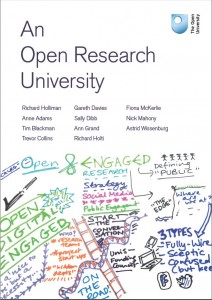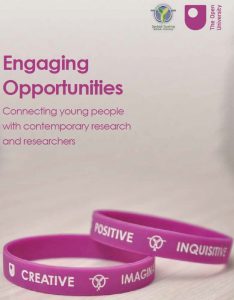
Professor Richard Holliman, The Open University.
This year, The Open University celebrates its 50th anniversary. Happy birthday to us!
As part of this celebration, the university is hosting an exciting programme of events and activities.
Yesterday I watched my colleague Martin Weller discuss the ongoing (and increasing influence) of openness in education. (You can access a recording of Martin’s lecture from the link in the previous sentence. Scroll down to the bottom of the page to watch the recording.)
It seems fitting, given the complementary nature of our work, that I was scheduled to deliver my inaugural lecture in this programme shortly after Martin.
Watching the lecture
If you’d like to attend the lecture on 12th March (6-7pm GMT) in person, select How to register. (It’s free to attend, but you need a ticket.)
From 5pm on the day, colleagues will be demonstrating various examples of engagement outside the lecture theatre.
To watch the lecture online, select Watch the webinar. The link will become live shortly before the start of the event. You can submit questions via email or Twitter from the same page.
The lecture will be recorded and made freely available after 12 March.
Promoting epistemic justice
When I pitched the idea for the lecture, I decided to talk about ‘Fairness in knowing’ by answering the related question, ‘How should we engage with the sciences?’
Why did I select this topic?
When the OU was founded, it established a mission for social justice that informs everything we do; to be open to people, places, methods and ideas.

An open research university (Holliman et al. 2015). Design: Peter Devine. Image: Beck Pitt.
Since that time, the ways that we realise our mission have changed. We now talk of open and engaged research, involving stakeholders, end-users and members of the public over any or all stages of a research process Holliman et al. 2015.
Since joining the OU more than 20 years ago my work has focused on aspects of communication and engagement.
Initially, I explored questions about how the sciences are represented in the public sphere.
Over recent years, my focus has shifted towards engaged strategies and practices. I’ve worked with academic and professional colleagues, and a range of external stakeholders, to catalyse organisational and cultural change.

Engaging Opportunities (Holliman et al. 2018)
My work sits at the boundary of theory and practice, at the sites where academics, professionals, decision makers and citizens seek to influence research-informed issues that have relevance to them.
In this talk I will explore how ideas about communication and engagement are changing, and seek to answer the following questions:
- How should we engage with the sciences?
- ‘How can we ensure that citizens have a meaningful voice in shaping how research has impact on society and the economy?’
I hope you can either join me in person or online to have your say and to celebrate the OU’s 50th birthday.
